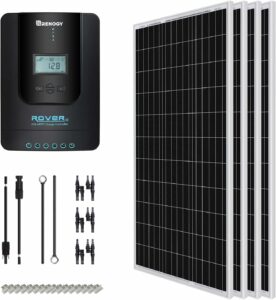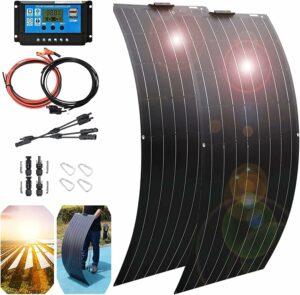Solar Panels for RVs: Sustainable Travel Made Easy
Introduction
In an age where sustainability and eco-consciousness are at the forefront of our choices, RV enthusiasts are embracing innovative solutions to make their journeys more enjoyable and environmentally responsible.
Integrating solar panels into recreational vehicles (RVs) is a game-changer among these solutions.
The ability to harness the sun’s power to fuel your adventures is an enticing prospect that has garnered significant attention in recent years.
Provo Green Products embodies a beacon of trust in sustainable discoveries, offering choices that enhance your life and leave a positive mark on our planet.
Leveraging extensive expertise in manufacturing, construction, and various trades, we provide a solid foundation for sustainable living.
Our meticulous research process guarantees that our information about each product is precise and current, allowing you to make informed decisions.
Whether your interest lies in solar products, electric bikes, or other eco-friendly alternatives, our commitment to credibility ensures you have access to dependable insights, guiding your journey toward a more sustainable lifestyle.
Provo Green Products is your go-to destination for finding the right green products for your lifestyle.
Disclosure: As an Amazon Associate, we may earn from qualifying purchases. This does not affect the product pricing whatsoever.
The Advantages of Solar Power in RVs
Regarding RV travel, adventurers increasingly turn to sustainable solutions to enhance their experiences while minimizing their environmental impact.
One such solution that has gained significant traction recently is using solar panels in recreational vehicles (RVs). In this article, we’ll delve into the numerous advantages of incorporating solar power into your RV, making your travels more eco-friendly and cost-effective.
- Energy Independence:
One of the most prominent advantages of installing solar panels on your RV is achieving energy independence that traditional RV power sources can’t provide. With solar panels, you harness the power of the sun to charge your batteries, reducing your reliance on campsite hookups or generators. This newfound independence opens up a world of possibilities for RV enthusiasts. You’re no longer bound to campsites with electrical hookups, allowing you to explore remote and off-grid locations without compromising power.
- Cost Savings:
Sustainability meets practicality when you consider the potential cost savings. While the initial investment in solar panels and associated equipment can be significant, it quickly pays off. Solar panels can significantly reduce your reliance on costly campsite fees, especially during extended trips. Furthermore, you’ll spend less on fuel for generators and maintenance, all contributing to a more cost-effective RV journey.
- Reduced Noise and Environmental Impact:
Traveling in an RV powered by solar panels is a remarkably quieter and more environmentally responsible experience. Unlike generators, which can be noisy and emit harmful emissions, solar panels operate silently and produce zero emissions. This enhances the serenity of your camping experience and contributes to a cleaner, greener planet.
- Low Maintenance:
Solar panels are remarkably low-maintenance, making them an ideal choice for RV owners. Once installed, they require minimal attention. Regular cleaning to remove dirt and debris is typically the only maintenance necessary. This low-maintenance feature frees up your time to enjoy your travels without the hassles of complex upkeep.
- Increased RV Value:
Investing in solar panels improves your travel experience and can increase your RV’s resale value. As sustainable practices become more mainstream, potential buyers are often willing to pay a premium for RVs equipped with solar power systems. This means that your initial investment can yield a return when it’s time to part ways with your beloved RV.
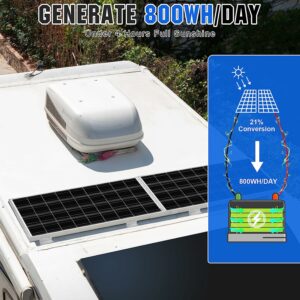
Selecting the Right Solar Panel Setup
Choosing the correct solar panel setup for your RV is a pivotal decision that directly impacts the effectiveness of your solar power system.
I think several factors should be considered, and a thoughtful approach to this selection process can ensure a setup that perfectly aligns with your needs and preferences.
Firstly, the size and capacity of the solar panels are essential considerations. Larger panels can generate more power but may need to be more practical for smaller RVs.
It’s essential to balance your energy requirements and the physical space available on your RV’s roof for panel installation.
Additionally, budget constraints play a significant role in your decision-making.
Solar panels come in a range of price points, and understanding your budget is crucial to making a choice that suits your financial capabilities.
It’s also advisable to consider the quality and durability of the panels, as investing in high-quality panels can pay off in the long run.
Whether a full-time RVer or a weekend warrior, selecting the correct solar panel setup is the foundation of a successful solar power system, providing you with the energy you need to power your adventures.
Installation Guide
Installing solar panels on your RV is a transformative step toward harnessing the sun’s power for your journeys.
While it may seem daunting, a carefully planned installation can ensure a trouble-free experience.
This section provides a step-by-step guide to help you navigate the process, ensuring your solar panel setup is not only practical but also safe:
- Assessment of Your RV’s Roof: Begin by thoroughly examining your RV’s roof. Identify the available space and note any obstructions such as vents, air conditioners, or roof vents. This assessment is crucial for determining the optimal placement of solar panels.
- Selecting the Mounting System: Choose a suitable mounting system for your solar panels. The most common options are fixed or tilt mounts. Fixed mounts are ideal for flat RV roofs, while tilt mounts are better for sloped roofs to maximize sun exposure. Ensure that the mounting system is compatible with your RV’s roof structure.
- Securing the Mounting Brackets: With the mounting system selected, securely attach the mounting brackets to your RV’s roof. Use appropriate fasteners and sealant to prevent leaks and ensure stability.
- Wiring and Electrical Connections: Carefully route the wiring from the solar panels to the charge controller. Following best practices for cable management, securing cables to prevent damage during travel is essential. Connect the solar panels to the charge controller, ensuring the polarity is correct.
- Charge Controller Installation: Mount the charge controller in a convenient and easily accessible location within your RV. This is the heart of your solar power system, regulating energy flow to your batteries and protecting them from overcharging.
- Battery Connection: Connect the charge controller to your RV’s battery bank. This step is critical in ensuring that the energy generated by the solar panels is stored for later use. Please follow the safety guidelines and connect the battery terminals correctly.
- Inverter Installation: If you plan to use AC appliances in your RV, install an inverter to convert DC power from the batteries into AC power. You can secure the inverter in a well-ventilated area to avoid overheating.
- Testing the System: Test your newly installed solar panel system before hitting the road. Please ensure that the solar panels generate power, the charge controller functions correctly, and the energy is stored in your batteries.
- Safety Precautions: Safety should be a top priority during installation. Use appropriate safety gear, follow electrical safety guidelines, and, if needed, consider professional assistance for complex installations.
- Professional Installation: While many RV owners choose to install their solar panels themselves, those who need more confidence in their DIY skills can opt for professional installation. Hiring an expert ensures that the installation is carried out efficiently and safely.
By following this comprehensive installation guide, you’ll be well on your way to harnessing the sun’s power for your RV adventures.
The process may require time and effort, but energy independence and sustainability benefits will make every step worthwhile.
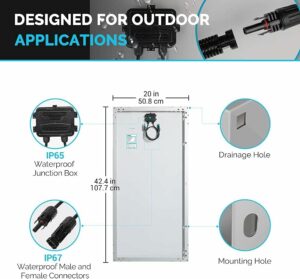
Solar Panel Maintenance Tips
Once your solar panel system is up and running, proper maintenance is crucial to ensure its longevity and continued efficiency.
Regular maintenance extends your solar panels’ lifespan and guarantees you get the most out of your investment.
Here are some essential maintenance tips for keeping your solar panels in optimal condition:
- Routine Cleaning: Dust, dirt, and debris can accumulate on the surface of your solar panels over time, reducing their efficiency. Cleaning your panels regularly, especially in dusty environments, is essential. Use a soft brush, mild detergent, and water to clean the surface gently. Avoid abrasive materials or harsh chemicals that may scratch the panels.
- Inspection for Damage: Inspect your solar panels for any signs of physical damage, such as cracks or loose connections. If you notice any damage, please take care of it immediately to avoid further issues.
- Check for Shading: Ensure that your solar panels remain unshaded. Even a small amount of shading on a solar panel can significantly reduce its power output. Trim nearby branches or other obstructions that may cast shadows on the panels.
- Tighten Loose Connections: Make it a habit to check and tighten electrical connections regularly. Loose connections can lead to power loss and potential damage to your system. Properly secured connections help maintain the efficiency of your solar panel system.
- Monitoring Energy Output: Install monitoring systems or use the ones with your solar panels to keep track of energy production. If you notice a significant drop in energy output, it could be a sign of a malfunction that requires attention.
- Winter Maintenance: In colder climates, it’s essential to clear snow and ice from your solar panels to ensure they continue to generate power during the winter months. Snow can block sunlight and reduce energy production.
- Professional Inspections: Consider scheduling periodic professional inspections of your solar panel system. Certified technicians can identify issues that may take time to be evident and recommend maintenance or repairs.
- Keep Records: Maintain records of maintenance activities, including cleaning schedules, inspections, and any issues encountered. This documentation can be invaluable for tracking the performance of your solar panel system over time.
- Battery Maintenance: If your RV solar setup includes batteries, follow manufacturer recommendations for battery maintenance. This may include checking water levels, cleaning terminals, and ensuring proper charging.
- Storm Preparedness: Take precautions to protect your solar panels from damage during severe weather. You can secure loose items that could become projectiles in high winds and consider covering the panels if a hailstorm is forecasted.
By adhering to these maintenance tips, you can ensure that your solar panel system continues to operate efficiently, providing you with a reliable power source for your RV adventures.
Regular care and attention will not only extend the life of your solar panels but also contribute to a more sustainable and cost-effective RV travel experience.
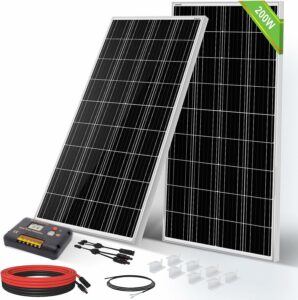
Power Management and Energy Storage
Efficient power management and energy storage are integral to maximizing the benefits of your solar panel system in your RV.
These aspects ensure a reliable power source for all your needs, whether exploring remote locations or simply enjoying the comforts of home on wheels.
Let’s delve into the key components and considerations for effective power management and energy storage:
- Understanding Charge Controllers: A charge controller is vital to your solar panel system. It regulates the voltage and current from the solar panels to ensure that your batteries are not overcharged or damaged. Depending on your system’s size, you may need a PWM (Pulse-Width Modulation) or MPPT (Maximum Power Point Tracking) controller. Understanding and selecting the right type for your setup is crucial for efficient energy storage.
- Selecting the Right Batteries: The type of batteries you choose for energy storage plays a significant role in your RV’s power management. Deep-cycle batteries, such as AGM (Absorbent Glass Mat) or lithium-ion batteries, are popular due to their ability to withstand regular discharging and recharging cycles. Lithium-ion batteries, in particular, offer a longer lifespan and lighter weight but come at a higher cost.
- Battery Bank Sizing: To meet your energy needs, you must size your battery bank appropriately. Consider factors such as your daily energy consumption, the duration of your trips, and the availability of sunlight. A well-sized battery bank ensures enough stored energy to power your RV even during cloudy days or nights.
- Power Inverters: A power inverter is essential if you plan to use standard AC appliances or devices in your RV. It converts the DC power stored in your batteries into AC power. The inverter’s wattage rating should be sufficient to support your appliances comfortably.
- Energy Monitoring Systems: Install an energy monitoring system to keep track of your power consumption and generation. This technology allows you to make real-time decisions to conserve energy and ensure that your batteries stay within a safe state of charge.
- Discharging and Recharging Strategies: Implement efficient discharging and recharging strategies to prolong the life of your batteries. Avoid deep discharges, and recharge your batteries regularly. Using battery maintenance and charging profiles can help optimize the process.
- Alternative Energy Sources: Besides solar panels, consider integrating alternative energy sources like wind turbines or generators. These backups can provide power during extended periods of low sunlight or high energy demand.
- Balancing Your Power Supply: Achieving a balance between power supply and demand is crucial. Prioritize essential loads to conserve energy during cloudy days and ensure you have power when needed.
- Emergency Backup Plan: Always have a backup plan for unforeseen situations. Could you carry a portable generator or extra fuel for your generator to address unexpected energy shortages?
Efficient power management and energy storage are central to enjoying the benefits of solar panels in your RV.
A well-thought-out system and proper care and monitoring can provide a reliable and sustainable power source for your on-the-road adventures, ensuring you’re never left in the dark.
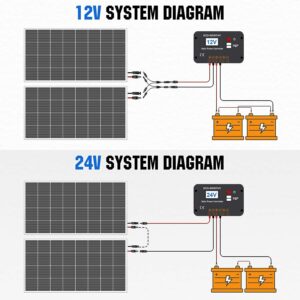
Conclusion
The advantages of incorporating solar power into your RV travel are both numerous and compelling.
Solar panels open up a world of possibilities for adventurous travelers from energy independence and cost savings to environmental responsibility and increased RV value.
In the spirit of sustainable travel, RV enthusiasts find solar power is the key to making their journeys more enjoyable, eco-friendly, and cost-effective.
Whether you’re a full-time RVer or an occasional road tripper, solar panels can undoubtedly transform your travel experience, one sunbeam at a time.
Stay in Touch!
I’am a dedicated entrepreneur with many years of experience and an integrity-driven individual who is highly motivated to succeed. Leveraging extensive expertise in manufacturing, construction, and various trades, we can provide a solid foundation for sustainable living. Our meticulous research process guarantees that our information about each product is precise and current, allowing you to make informed decisions. A deep understanding of business operations empowers me to consistently implement improvements that result in ongoing success. Visit site.

